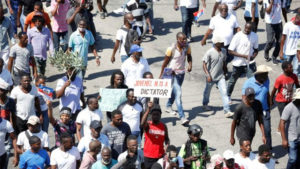 PORT-AU-PRINCE (Reuters) – Haitians used flaming tires, trucks and debris to barricade some of Port-au-Prince’s main roads on Monday to protest the insecurity wracking the country in the wake of the deaths of police officers in a botched raid on a gang stronghold.
PORT-AU-PRINCE (Reuters) – Haitians used flaming tires, trucks and debris to barricade some of Port-au-Prince’s main roads on Monday to protest the insecurity wracking the country in the wake of the deaths of police officers in a botched raid on a gang stronghold.
Kidnappings and murders in the poorest country in the Americas have surged over the past year as gangs have gained power amid a deepening economic and political crisis, even creating a broad federation of gangs.
At least four police officers were killed and eight injured on Friday in an attempted raid on the Village de Dieu slum in the capital, where kidnapping victims are often kept and which has become a no-go area in recent years, authorities said.
Videos circulating on social media showed gang members dragging and beating the bodies of SWAT officers, brandishing the heavy weapons, ammunition and armored vehicles they commandeered from them.
President Jovenel Moise denounced the acts as “a declaration of war against society,” called on security forces to continue working to free Village de Dieu and announced three days of national mourning.
Human rights activists, though, accuse his government of fostering gang activity. The alleged perpetrators of massacres that have taken place during his administration in opposition strongholds remain free and the cases against them appear to have stalled.
Although the government agreed to raise funding for Haiti’s’ police force this year, it remains ill equipped and understaffed to face off the gangs that have proliferated in recent years, making swaths of the capital no-go areas.
Friday’s debacle has added more fuel to calls for Moise, who has been ruling by decree since parliament dissolved more than a year ago, to either step down or hold elections immediately, with the new hashtag #FreeHaiti trending in recent days.
But Moise blames chronic unrest on the opposition and oligarchs who he says want to force him out undemocratically.
He says he wants to reform the constitution to ensure an end to the political instability that has plagued Haiti since the return of democracy 35 years ago before holding new parliamentary elections.
Critics say he will only amass more power through the reform and appears to be trying to install a dictatorship. They hope the United States, Haiti’s main donor, will stop backing Moise under President Joe Biden.
The U.S. administration has started expressing increasing concern over Moise’s rule by decree.
“I share concern about some of the authoritarian and undemocratic actions that we’ve seen,” Secretary of State Antony Blinken told a congressional hearing last week, a statement the U.S. embassy in Haiti retweeted on Monday.
